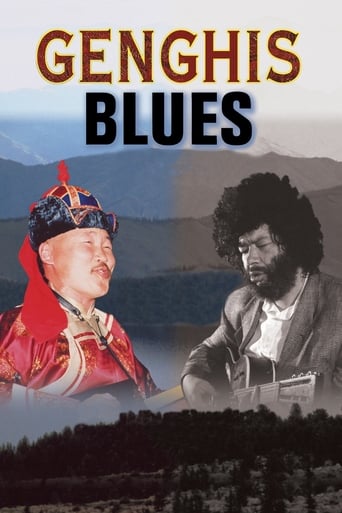birthdaynoodle
Blind, American bluesman Paul Peña was going through a very tough period in his life, particularly after having lost his wife, when he came across a CD of Tuvan throat singing, with which he absolutely fell in love. (Tuva is a region in southern Siberia, just north of Mongolia.) Peña not only taught himself throat singing and incorporated it to his blues, but also began to learn the Tuvan language by translating words from a Tuvan dictionary into Russian and then English, as he couldn't find a Tuvan-English dictionary. (Keep in mind the guy was blind.) He then made contact with the Tuvan music community and flew there to join them. He might as well have traveled across the galaxy.It's amazing how, despite the language and cultural barriers, Peña was able to establish a deep connection with his Tuvan hosts through a shared passion for music, particularly with the celebrated throat singer Kongar-ol Ondar, who took him under his wing during the visit. Seeing these two men jam and interact with each other, I had to wonder whether perhaps they'd been brothers in a previous lifetime. To think that they came from opposite sides of the world... Like Peña, the film's audience is treated to the generous spirit of Tuvan society. What hospitality! While the region wouldn't seem to offer much in terms of material luxury, their culture puts things into perspective and raises questions regarding our own values. As cliché as it might sound, they show there's nothing in life like shared joy, human warmth and communication. And that's pretty much what this film is all about!It's true that one may find more sophisticated photography and editing in other documentaries, but what this one lacks in technical virtuosity, it more than makes up for in heart. Beautiful and bittersweet, this is one film not to be missed.
Torch-6
You may have heard about "harmonic singing" or "Throat Singing," in which the performer can isolate two-to-several harmonics on their vocal cords, giving the impression that more than one voice is singing. Such a description is like saying Shakespeare wrote a couple of plays.Harmonic singing is endemic to the nation of Tannu Tuva, once a member of the USSR, now just Tuva. Brought to some notoriety by famous physicist Richard Feynman and his student Ralph Leighton, Tuva is a beautiful place, reminiscent of Montana--if Montana had been settled by the Mongol Hordes.But throat-singing is an enchanting, mystical, unreal sound--and one that takes some getting used to. "Genghis Blues" chronicles the journey of a blind bluesman to Tannu Tuva, after he stumbled across a Radio Moscow broadcast of Tuvan throat-singing, his journey to Tuva, and the people he meets there. Nominated for best documentary oscar (insert trademark nonsense here) for 1999, this film is a must-see for those who enjoy vicarious travel to places you've never even heard of.
smakawhat
Incredible journey, told in this documentary. It was well paced, never boring, humorous and inspiring. An amazing accomplishment from such a fascinating person.Rating 8 out of 10
Bruce Burns
In 1995, an eclectic group of San Francisco musicians and their friends took a trip to the remote Russian-Mongolian region of Tuva, where one of them entered a throat-singing contest. The whole thing was filmed and this is the result.Paul "Earthquake" Pena is a blind San Francisco blues singer-guitarist-harmonica player who has worked with the likes of B.B. King, Jerry Garcia, John Lee Hooker, Bonnie Raitt, and T-bone Walker. In the early '70's, he made a rock album that included the song "Jet Airliner", later covered and made into a hit by the Steve Miller Band. The important thing about Pena, as far as this film is concerned, however, is that he is a self-taught master of Tuvan-style throat-singing.Throat-singing is a style of singing where one sings two or three notes at once, with some very interesting harmonic effects. As pointed out in examples in the film, the sounds are similar to nose-flutes, Jews-harps, Australian dijeridoos, and leaf-blowers.Pena's adventures begin when he goes to a concert in Frisco given by Kongar-al Ondar, who is described as the Elvis of Tuvan throat-singing. Ondar hears Pena sing and invites him to go to Tuva to compete in a throat-singing contest. A somewhat bizarre organization known as the Friends of Tuva arranges the trip for Pena, his trombone-playing friend, a recording engineer, and an eccentric elderly DJ. They also arrange to have the trip filmed by Roko Belic and his brother.The film is mostly about how Pena wins the hearts of Tuvans by singing traditional Tuvan folk songs, and then combining the singing style with the Delta blues he specializes in. It also concentrates on the friendship that is forged between Pena and Ondar.While this is not exactly top-of-the-line stuff (Hi-Def video just ain't no substitute for film), and we never really learn about anyone besides Pena and the late physicist Richard Feynman, who co-founded the Friends of Tuva, this is truly a fascinating movie, so I gave it an 8.


 AD
AD
